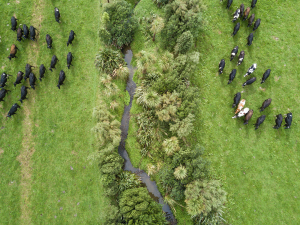DairyNZ opens applications for associate director role
DairyNZ is giving New Zealand farmers a unique opportunity to gain hands-on governance and leadership experience within the dairy sector.
 Throughout the Selwyn and Hinds programme, different options for reducing N loss were trialled across individual farms, depending on the needs of specific farm systems.
Throughout the Selwyn and Hinds programme, different options for reducing N loss were trialled across individual farms, depending on the needs of specific farm systems.
A DairyNZ programme to help farmers in two Canterbury catchments to reduce N loss has proved highly successful.
The programme involved 40 dairy farmers in the Selwyn and Hinds catchments started five years ago and the data shows that at least one farming couple have already met the target of reducing their N losses by 25%. That’s seven years ahead of the time frame set by government.
Overseer information shows N loss reductions of 29% from the 2017/18 season to 2021/22, and a report just released shows a continued downward trend in mean N loss per hectare from dairy farms across Canterbury – a 27.5% decrease over five years to 2021-22.
The Selwyn and Hinds programme aimed to support dairy farmers in the two catchments to meet Environment Canterbury and central government N loss reduction targets, while optimising profit and resilience. DairyNZ general manager for sustainable dairy, Dr David Burger, says the amount of change in both catchments is encouraging and shows the sector is moving in the right direction.
He says the programme has supported dairy farmers to reduce N losses by implementing solutions that work at a farm level, complementing the positive work already being done by farmers and rural professionals.
“It has also presented good opportunities for dairy farmers to share ideas and work with scientists and sector experts. Farmers have been using the information available to them to implement the best options for their farms,” he says.
Dr Burger says dairy farmers across Canterbury are improving effluent and irrigation management, reducing fertiliser use and increasing their focus on overall efficiency of farm systems, which helps reduce nitrogen being lost into groundwater.
Throughout the Selwyn and Hinds programme, different options for reducing N loss were trialled across individual farms, depending on the needs of specific farm systems.
The results and lessons were shared with other local farmers through field days and events.
Examples of effective options include crops, which are grown to contain excess nitrogen in soils that may otherwise be lost through leaching, and plantain, a low-cost, high-impact mitigation many farmers have incorporated.
The Selwyn and Hinds programme was an extension of previous DairyNZled N loss farm systems research, such as Pastoral 21 and Forage for Reduce N leaching. Many partner farms implemented several of the options identified by this previous research.
As New Zealand marks the United Nations’ International Year of the Woman Farmer 2026 (IYWF 2026), industry leaders are challenging the misconception that women only support farming.
Fonterra’s impending exit from the Australian dairy industry is a major event but the story doesn’t change too much for farmers.
Expect greater collaboration between Massey University’s school of Agriculture and Environment and Ireland’s leading agriculture university, the University College of Dublin (UCD), in the future.
A partnership between Torere Macadamias Ltd and the Riddet Institute aims to unlock value from macadamia nuts while growing the next generation of Māori agribusiness researchers.
A new partnership between Dairy Women’s Network (DWN) and NZAgbiz aims to make evidence-based calf rearing practices accessible to all farm teams.
Despite some trying circumstances recently, the cherry season looks set to emerge on top of things.
OPINION: Fonterra may be on the verge of selling its consumer business in New Zealand, but the co-operative is not…
OPINION: What does the birth rate in China have to do with stock trading? Just ask a2 Milk Company.